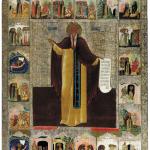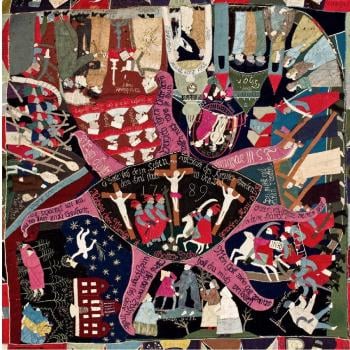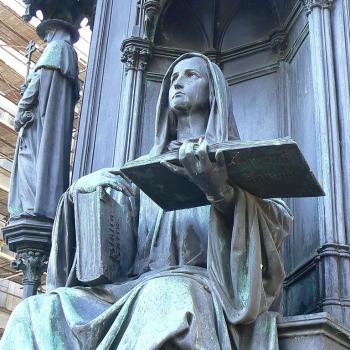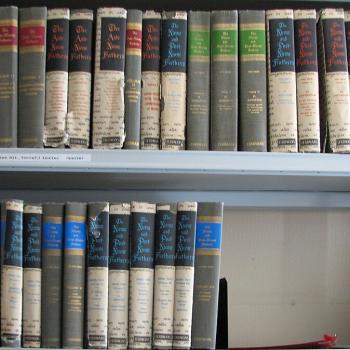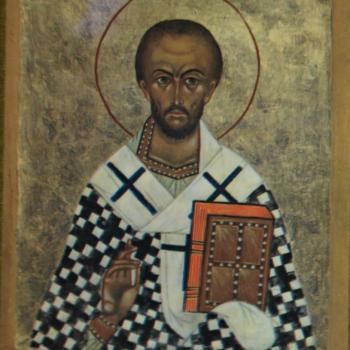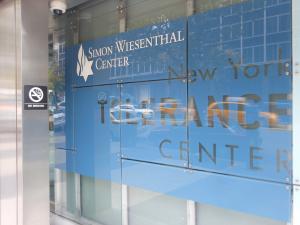
Meeting with a delegation from the Simon Wiesenthal Center on January 20, 2020, Pope Francis reiterated his concern for the growth of antisemitism in the world. In doing so, he made it clear that antisemitism must be confronted and opposed, wherever it is found:
Hatred and the sowing of evil. Even recently, we have witnessed a barbaric resurgence of cases of antisemitism. Once more I firmly condemn every form of antisemitism. To tackle the cause of the problem, however, we must commit ourselves also to tilling the soil in which hatred grows and sowing peace instead. For it is through integration and seeking to understand others that we more effectively protect ourselves. Hence it is urgent to reintegrate those who are marginalized, to reach out to those far away, to support those ignored for lack of resources or funds, and assist to those who are victims of intolerance and discrimination.[1]
We need to confront antisemitism, and the hatred which creates it, within ourselves, making sure it will not take root within. We should not give it any ground. When we find it. We must uproot it. We must not let it fester. We must not let it grow. We must not let it turn into hate, even as we must not let any hateful prejudice take us over and inspire dangerous ideologies which lead to death and destruction in the world.
Speaking to another delegation from the Simon Wiesenthal Center in 2013, Pope Francis explained how important he thought their meetings were, pointing out that they are more than just about antisemitism. Rather, they are about rooting out all forms of racism, so that the Shoah, or something similar to it, would not happen again:
These meetings are a concrete sign of the respect and esteem which you have for the Bishops of Rome, for which I am grateful. They are likewise an expression of the appreciation of the Pope for the task to which you have dedicated yourselves: to combat every form of racism, intolerance and anti-Semitism, to keep alive the memory of the Shoah, and to promote mutual understanding through education and commitment to the good of society.[2]
After the Shoah, Christian theology has had to come to grips with the antisemitic attitudes Christianity has spread throughout Christian history. Often, such antisemitism is easy to discern, such as when Jews are blamed for the death of Jesus. But, at other times, it is not so easy, as it can come in subtle forms. Even those with the best intentions can be influenced by the subtle forms of antisemitism, especially when they follow traditional forms of exegesis without considering the faults and limitations which can be discerned by such exegesis. Many who are not consciously antisemitic, who do not desire to promote antisemitism, nonetheless can be found continuing various elements of Christian antisemitism as they pass out tradition uncritically. Pope Francis’s words about committing ourselves to till the soil from which prejudices and hatred flow, therefore, requires us to till the soil of tradition, even as it means to root out such antisemitism when we find it being expressed, often inadvertently, in theologians we otherwise respect.
Thus, for example, some have noted how various Liberation Theologians have continued various antisemitic attitudes in their writings. It is likely this comes as a result of their own theological education, where they have taken in traditional interpretations of Scripture and write from them without consideration of the corrections which needed to be made. Certainly, the principles of Liberation Theology as a whole would stand against any and all forms of antisemitism, because Liberation Theology promotes helping for and standing with the victims of the world, but as John Pawlikoski explained, we all have blind spots:
I speak of what appears to us as a return to a sometimes blatant form of anti-Judaism in liberation theology that seems to totally ignore Nostra Aetate and the subsequent official Catholic and Protestant statements. My colleague Clark Williamson and I have both investigated this disturbing trend. Not all liberation theologians are guilty of it. In fact, Gustavo Gutierrez and Jose Miguez Bonino make a positive contribution in my judgment by returning us to the Exodus God of history as a central, ongoing source of revelation for Christian faith in our time. But with Leonardo Boff, Jon Sobrino, and J. Severino Croatto, we have an overwhelmingly, displacement-oriented theology of Judaism which can no longer go unchallenged despite the real contributions these theologians have made to the overall life of the Church, especially in Latin America. We all have blind spots. And I am afraid their weakness here is very glaring to anyone who has integrated the directions made by recent Church statements. [3]
Pawlikoski, to be sure, says not all Liberation Theologians suffer from antisemitic thought, but he is correct in stating that the dark underbelly of antisemitic interpretations of Scripture and history have found their way in the writings of various Liberation Theologians, such as Jon Sobrino. Two examples of this problem can be found in his book, Christ the Liberator.
First, he talks about how the New Testament “downplays” the role of the Jews in Jesus’s death:
The New Testament tends to play down the responsibility of the Jews for Jesus’ death (“I know that you acted in ignorance,” Acts 3:17), but this does not alter the relational dimension of God’s action, so that what the resurrection says of God is going to be essentially related to what others have done to Jesus. [4]
Here, we find hiding behind his exposition the tired old antisemitic slur that the Jews are responsible for the death of Jesus. That is, he suggests the New Testament whitewashes the responsibility of the Jews, and the only way someone can make that claim is if they think the Jews are somehow to be held responsible for the crucifixion of Christ. This, of course, goes against Nostra Aetate, where it is made clear, the Jews as a whole should not be accused for the death of Christ:
True, the Jewish authorities and those who followed their lead pressed for the death of Christ; still, what happened in His passion cannot be charged against all the Jews, without distinction, then alive, nor against the Jews of today.[5]
Secondly, Sobrino looks to the Jewish tradition of the priesthood up to and including the time of Christ, and said that its positioning itself as mediators of God’s grace to the world was blasphemous:
So the mediating and priestly character of world religions in the Old Testament has changed because its basic presupposition – our understanding of the nature of God – has changed, and with this the old priesthood has automatically been abolished, even if it is not mentioned in the letter to the Hebrews. To sum up, there is nothing crated that serves as efficient cause of the saving coming of God, nor it is necessary that there should be. To claim that there is – as the so-called just did at the time of Jesus – is blasphemy in the strict sense, because it is going against the deepest aspect of God himself and of God’s will. The old priesthood, therefore, is superfluous, and worse, it is a threat against the reality of God.[6]
Here, the denigration of the Jewish tradition almost reads like a Marcionic criticism of the Jewish faith. It not just a claim that the Jews were wrong in not recognizing Jesus as the Messiah, for Christians and Jews will have differences in their faith and those disagreements alone do not indicate antisemitism. Rather, it is the claim that they held a held a spiritual and religious tradition which was fundamentally blasphemous that is the problem. Indeed, that charge itself is blasphemous, because the Jews were expressly chosen by God to be a vessel of revelation to the world. Their religious tradition and the structures of the priesthood found in it was a part of that revelation; Christians and Jews, after the destruction of the Temple, certainly found different ways to understand what that revelation entailed, but the thing that Christians must not do is suggest the pre-Christian system was itself blasphemous. Not only does it strike against a core Christian belief concerning the legacy of the Jews, it sets them far from God, allowing zealots then to denigrate the Jews, if not outright support their destruction.
It is likely Sobrino did not intend anything antisemitic with his work, and he would be shocked and horrified if his thought were ever used to inspire hatred against the Jews, making them once again victims in the world. For his thought is about how the incarnation makes God one with the victims of history and the exaltation of Christ is the exaltation and justification of the victims against their oppressors. The charge, then, is not about Sobrino, or other Liberation Theologians like him, or even other theologians concerned with issues of justice in a post-colonial world, are consciously promoting antisemitism, but rather, the demonstration of how its dark and insidious tentacles continue to influence the thought of those whose theological principles should be at the forefront of the struggle against antisemitism. That is, to confront antisemitism, Christians need to struggle with themselves, with the unconscious ways antisemitism often continues to be spread, so that no seed of antisemitic thought is given fertile soil to grow.
As we now reach the 75th anniversary of the liberation of Auschwitz-Birkenau concentration camp (on Jan 27th), we now must continue the work of liberation in the world by purifying the Christian theological tradition by rooting out the various kernels of antisemitic thought which continue to be passed down in various theological circles. We must root out antisemitism. We must not allow the Shoah to happen again.
[1] Pope Francis, “To a Delegation of the Simon Wiesenthal Center” (1-20-2020).
[2] Pope Francis, “To the Delegation of the Simon Wiesenthal Center” (10-24-2013).
[3] John T. Pawlikowski, “Christian Theological Concerns After the Holocaust” in Visions of the Other: Jewish and Christian Theologians Asses the Dialogue. Ed. Eugene J. Fisher (New York: Paulist Press, 1994), 43-4.
[4] Jon Sobrino, Christ the Liberator. Trans. Paul Burns (Maryknoll, NY: Orbis Books, 2001), 85.
[5] Nostra Aetate. Vatican translation. ¶4.
[6] Jon Sobrino, Christ the Liberator, 128.
Stay in touch! Like A Little Bit of Nothing on Facebook.
If you liked what you read, please consider sharing it with your friends and family!


